Category: Medicis Daughter
Christmas Came Early for Me!
It’s been a great week in reviews for MÉDICIS DAUGHTER!!!
First it made the Goodreads Best Books of the Month: December 2015 and I thought I’d died and gone to heaven. Then the love just kept on coming. You might even say Christmas came early for me:
a top ten for 2015, and I have no doubt I’ll be haunted by this one for a long while. ~Unabridged Chick
. . . this is a tale of overcoming obstacles and fighting for your place in the world. There is plenty of romance, drama, and political intrigue to keep even the most reluctant historical fiction reader entertained. ~Reading Lark
If you love historical fiction, or know someone that does, add this one to you Winter reading list- it’s perfect for curling up by the fire with! ~Bless Their Hearts Mom
I couldn’t put down. And when I wasn’t reading it, I was thinking about it. ~The Readers Hollow
Soaring, fascinating… this book has it all. ~Long and Short Reviews
It’s about time! Time to give the Tudors some competition. Time to show that the history of sixteenth century France is just as, if not more, gripping than that of Henry’s and Elizabeth’s England. In MÉDICIS DAUGHTER (St. Martin’s Press), Sophie Perinot rises to the challenge, offering a glimpse into the spectacular, turbulent years of the waning Valois dynasty. ~Writing the Renaissance
Rich with intrigue, rivalry and passion, Médicis Daughter is not to be missed. ~Flashlight Commentary
So, if you know someone who loves historical fiction, is sucked into dysfunctional family drama, or is fascinated by royal intrigue, Médicis Daughter might just make the perfect holiday gift!
A Very Special Review
Reviews come in all shapes and sizes. Obviously good ones are better than bad ones 😉 But once in a while an author receives a review that stands out, not because it is a rave (though it often is), but because the reviewer GETS the book on its deepest levels.
That is a euporic moment for the writer, because conveying meaning–our own particular meaning–is what we live for.
Today Médicis Daughter received such a review from Erin at “Flashlight Commentary.” Yes, Erin liked the book: “Atmospherically, the novel swept me off my feet. Perinot’s depiction of the French court was beautifully drawn and I was wholly captivated by both the political and social interaction that unfolded among its players.” But more importantly she understood my heroine, who is no cardboard princess, but very human and very flawed but still–in my estimation–laudable:
Margot fascinated me in her own right. She isn’t an easy character, but her layers and complexity are hard to ignore. Her family is ruthless and self-serving and while she possesses many of the same characteristics, she plays them much differently and distinguishing herself as a somewhat unique force. Her goals and ambitions are relatively modest, but her loyalties are often at odds. Her courage and tenacity are intriguing and while I didn’t always agree with the course of her actions, I found much admire in the determination and resolve required in carrying them out.
From where I am sitting this feels like a huge victory.
You can check out the rest of what Erin had to say here.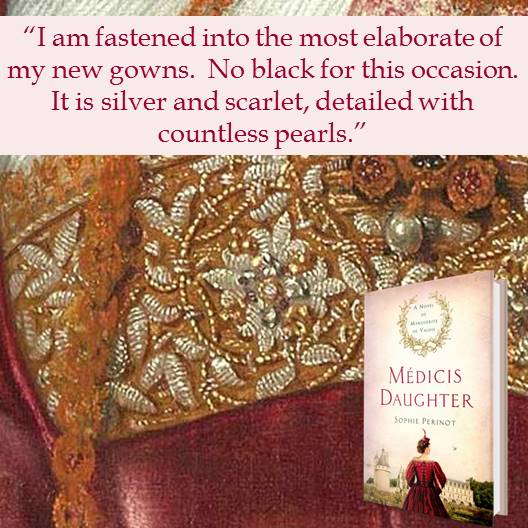
Calling all Reign Fans
It’s Launch Day!
It’s launch day my friends! After many months of research and writing and more months still in the production process, Médicis Daughter steps out on stage. If you haven’t already pre-ordered your copy (and if you have, thanks and please take a picture of your copy “in the wild” and share it with me on social media), you can now find it wherever books are sold. For easy, on-line, purchase links just click over to the Médicis Daughter page of this website.
I look forward to hearing what readers think of my Valois heroine and her family.
Medicis Daughter a Barnes & Noble December Top Fiction Pick
Wow. Pleased (and a tad astounded) to announce that Médicis Daughter made Barnes & Noble Read’s  “December’s Top Picks in Fiction” list! Seeing myself listed in the company of household names like Dean Koontz and Marina Fiorato (the best-selling author of The Glassblower of Murano) is extremely gratifying. Feels a little bit like Christmas has come early
“December’s Top Picks in Fiction” list! Seeing myself listed in the company of household names like Dean Koontz and Marina Fiorato (the best-selling author of The Glassblower of Murano) is extremely gratifying. Feels a little bit like Christmas has come early
Much to Be Thankful For!!!
“Thank you to Sophie Perinot for introducing me to a whole new section of historical fiction to now become obsessed with (move over Tudors)!”
Thank YOU Colleen at A Literary Vacation, and readers everywhere. Without a receptive audience what we writers do would be a little like a tree falling in the forest with no one to hear it. 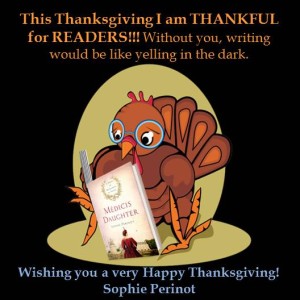
Yes I am SUPER thankful for readers, and particularly readers who take the time to review. Because here’s the thing: word of mouth is still the most powerful tool in the world when it comes to supporting novels.
So Thanks A Literary Vacation for this doozy of a review! For embracing the characters I lived with for so many long months and letting them become as real to you as they are to me:
I think one of my favorite thing about Margot (and really all of these characters) is that she isn’t perfect, not even close. Sophie Perinot did an astounding job of making each character so well rounded and complex that they felt wholly real to me, not just glitzed up or vilified representations of what someone might want them to be.
And for understanding and perfectly expressing the essence of Médicis Daughter:
With all this going on (and there is a lot of action and intrigue to delight in, perfectly presented by the author) the real heart of the story, to me, is much smaller: that of a beautiful, intelligent girl long held prisoner to her family’s demands, threats and machinations finally learning how to break free, at least in part, from their control to become the woman of honor she longs to be.
I couldn’t have said it better myself!
The Royals Take a “Vacation”
I am extremely pleased to be guest blogging at Literary Vacation with Colleen Turner today. Given that the title of her blog is “Literary Vacation” I couldn’t resist taking the opportunity to talk about “Around the Kingdom in 829 Days: Charles IX’s Royal Progress” (a trip begun in the spring of 1564). Please join us. 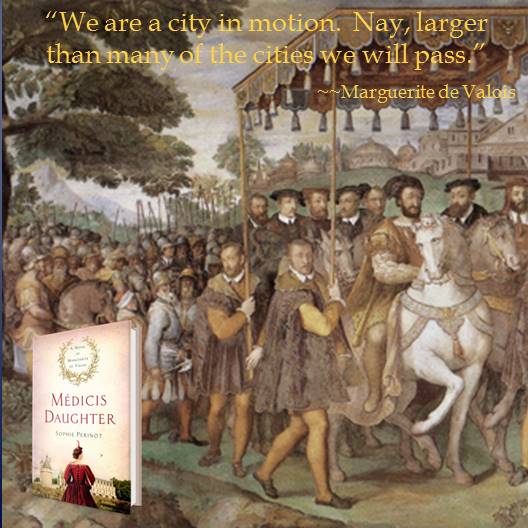
Fans Matter
Fans matter. I know I’ve said this before, but I am saying it again.
First and foremost you bring the characters to life. True, I write them, but if characters speak or acts on a page but nobody reads it they remain vision, vapor, not living and breathing flesh. Writing is solitary enough in the doing, the thought of the results going unread—that would turn solitude into loneliness. So THANK YOU for not letting that happen to my words.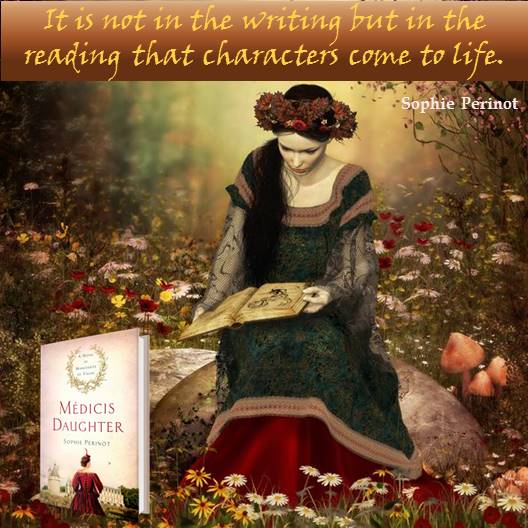
But if fans provide a reason to write they also give writers the ability to continue. Because this is a business, make no mistake about that. Our publishers are not just putting our books out there on charitable impulse. We measure up to whatever their goals for us are, or they move on. So when fans do a few simple things they support us in important ways. What simple things? Ha, aren’t you glad I asked for you?
1) Add the books of your favorite authors to your goodreads TBR pile. This is one click. Please click. Here is the link for Médicis Daughter
2) If you want to wait to pick up a book at a library that’s great. My first paid job was shelving non-fiction books at my local library. I love libraries. If, however, you are inclined to buy a book and you have the means to do so, pre-orders or purchases immediately after a book releases pack a whallop. Here’s my famous (infamous) blog on that subject.
3) Review. It doesn’t have to be two paragraphs. It can be two lines. You don’t need to post everywhere. But sharing what you thought of my work—or any author’s work—at a couple of locations if you have an on-line presence . . . no greater gift my friends.
4) Recommend. Readers talk books. We can’t help it. And we should not try to. Word of mouth remains the most powerful tool for helping good books to do well. Reader enthusiasm is contagious. So mention books you like to other bibliophiles. Your author friends will bless you.
Marguerite de Valois: Shinning a Light on a Much Maligned French Princess
Light is a frequent literary device. It can be an emblem of hope, a way to see what has been hidden, even a method of symbolically driving back demons. This month a collection of historical novelists, including myself, have decided to use light in all those ways, by creating a weekly blog event (#LightOnOurLadies) to illuminate the historical women at the center of our writings. The main character in my next novel, Médicis Daughter, is profoundly in need of such illumination. 
History has not been kind to 16th century French Princess Marguerite de Valois. In fact, she has been quite viciously misremembered as a wanton and a woman without substance. Before I explain how I think that happened, please allow me to shine a little light on the real Marguerite.
Born at the Château of Saint-Germain overlooking the Seine, as her father had been before her, Marguerite (or Margot as she was affectionately called) was the eighth child of King Henri II of France and Queen Catherine de Médicis. Described by the poet Ronsard as tall and graceful, with fine pale skin, sparkling black eyes, and chestnut hair, Margot stood out even at a Court renowned for its beauties. But she had more than looks going for her—far more. A true granddaughter of François I, Margot was highly intelligent. She loved books, and often got so swept away by them that she forgot to eat or sleep (sound familiar to anyone reading this?). As a mature woman, Margot was a serious and influential force in the literary life of France. A student of more than literature, Margot was a solid classics scholar. She spoke multiple languages fluently, and also had a genuine talent for public speaking. This she was frequently asked to do, often representing one royal brother or another. Finally Margot had a keen grasp of the fine points of statecraft. Arguably her political acumen exceeded that of her brothers, making her the most similar of all her siblings to her strong-willed, politically expert mother, Catherine de Médicis.
Why then, if Margot was as competent as she was pretty is she so little remembered? And when recalled, why is Margot depicted not as she was, but as lascivious and nearly amoral?
To put it simply, Marguerite de Valois was a victim of poor timing. She was born at the end of her dynasty.
When a royal house expires, its last years are generally recounted by people who have political and personal agendas that make it tempting to denigrate their predecessors. Such was the fate of Valois in the late 16th Century. Slander and denigration of royal family began during their lifetimes, largely fed by the tensions and rivalries of a vicious series of wars (the French Wars of Religion) that stretched from the early 1560s beyond the end of the Valois reign. No member of the Valois was exempt from the attacks of gossips, or from the writings of anonymous political pamphleteers. Anti-Valois propagandists seeking to degrade Marguerite chose that easiest and most ancient path for destroying a woman: assertions of rabid sexual desire and wanton conduct.
Slanderous talk about Margot began early among her family’s enemies, but she owes most of the lasting defamation of her character to a single printed work, Le divorce Satyrique. This malicious pamphlet was composed in her lifetime. It mocked and insulted Margot as it set out grounds for a proposed annulment of her marriage to Henri de Bourbon. Margot’s cousin/husband was no longer merely King of the Navarre, but King Henri IV of France—and a king in need of an heir. We all know that a King in need of an heir will do what it takes to be rid of a queen who cannot give him one. So, grounds for an annulment were created and printed. That such a piece of propaganda should have been taken up as fact and treated as history for so long may seem astounding to us today, but early chroniclers of the French court were often not particularly concerned with objectivity. Nor were early historians. As Robert Ja Sealy remarks in The Myth of the Reine Margot, “the documentary sources for our knowledge. . . were written during the wars of religion and, all too frequently are colored by political expediency . . .” Objectivity as a goal rather than a veneer is a rather recent requirement for history and historians. Even some of the histories written in the 19th and early 20th centuries make no pretense at objectivity in recounting the period of the Wars of Religion. Rather, their authors unabashedly announce in their prefaces which side they are on. Margot, considered not a particularly important historical player, remained largely unexamined. The myths about her grew and thrived in darkness.
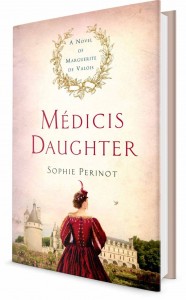 In Médicis Daughter I’ve focused a strong and clear light on the historical Marguerite, creating a coming-of-age story that does her better justice than she received from Valois disparagers, or from those later historians who saw no reason to look more closely. Médicis Daughter releases six weeks from today. To learn more about the book, visit the novel’s page at Amazon, or on Facebook.
In Médicis Daughter I’ve focused a strong and clear light on the historical Marguerite, creating a coming-of-age story that does her better justice than she received from Valois disparagers, or from those later historians who saw no reason to look more closely. Médicis Daughter releases six weeks from today. To learn more about the book, visit the novel’s page at Amazon, or on Facebook.
And now,
As part of the Shining Light on Our Ladies Tour, please meet my fellow authors Helen Hollick and Alison Morton… and their ladies
 Alison Morton is a woman after my own heart.
Alison Morton is a woman after my own heart.
Raised by a feminist mother and an ex-military father, it never occurred to Alison Morton that women couldn’t serve their country in the armed forces. After six years, she left as a captain, having done all sorts of interesting and exciting things she can’t talk about, even now…
Fascinated by the complex, power and value-driven Roman civilisation since childhood, she wondered what a modern Roman society would be like if run by strong women…
Alison lives in France and writes award-winning Roman-themed alternate history thrillers with tough Praetorian heroines – INCEPTIO, PERFIDITAS, SUCCESSIO and now
… AURELIA: Late in 1960s, Aurelia is sent to Berlin to investigate silver smuggling, former Praetorian Aurelia Mitela barely escapes a near-lethal trap. Her old enemy is at the heart of all her troubles and she pursues him back home to Roma Nova but he has struck at her most vulnerable point her young daughter. Please visit Alison (and Aurelia) to read more – and a chance to win a paperback copy of Aurelia
 Helen Hollick is a fierce advocate for Indie Authors.
Helen Hollick is a fierce advocate for Indie Authors.
She lives on a thirteen-acre farm in Devon, England. Born in London, Helen wrote pony stories as a teenager, moved to science-fiction and fantasy, and then discovered historical fiction. Published for over twenty years with her Arthurian Trilogy, and the 1066 era, she became a ‘USA Today’ bestseller with Forever Queen. She also writes the Sea Witch Voyages, pirate-based fantasy adventures. As a supporter of Indie Authors she is Managing Editor for the Historical Novel Society Indie Reviews, and inaugurated the HNS Indie Award.
On her blog today Helen introduces some ladies from the Court of King Arthur, except this ‘court’ is set in 5th century Britain and her Gwenhwyfar, Morgause and Morgaine are very different from the ladies of the Medieval tales!
ENJOYING THE SHINING LIGHT ON OUR LADIES TOUR? Then please join us again NEXT TUESDAY when we set sail with Captain Jesamiah Acorne’s ladies aboard Sea Witch, meet a lady surgeon disguised as a man aboard another ship, and are introduced to lady blackmailed into marrying a knight….
A Picture is Worth a Thousand Words . . .
In the last few days, as I gear up for all the pre-release madness for Médicis Daughter, some wonderful images representing the book have been created. Wanted to share them with you all. I just love <3 them!!! I also wanted to remind everyone that pre-orders are the gift that keeps on giving from an author’s point of view. If you already know that you are going to be snapping up Médicis Daughter as soon as it hits shelves, please consider pre-ordering from your favorite source (B&N, Indiebound, Amazon . . . wherever you like best)! Because not all sales are reated equa–even if they are sales of the same title, in the same format for the same price 
In the hierarchy of power purchases the pre-order is the heavy hitter. Why? Because print runs (the number of books initially printed) for books coming out in hardback or paperback are set, in part, based on a title’s pre-order numbers, and how much support a book will get from booksellers is also heavily influenced by whether they perceive there is an enthusiastic audience for the title.


